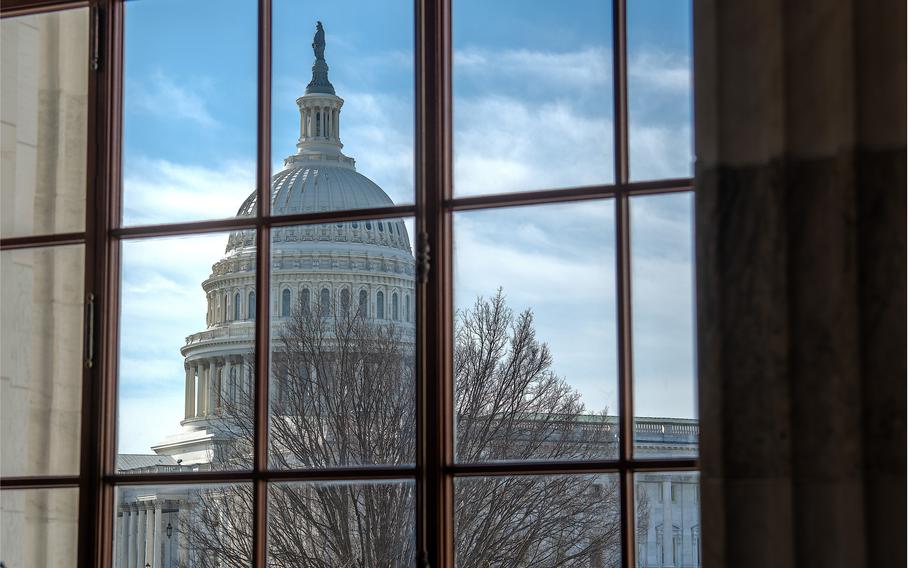
The U.S. Capitol building is seen through a window in the Russell Senate Office Building in Washington. (Carlos Bongioanni/Stars and Stripes)
The Congressional Review Act deserves your attention. Despite being on the books for decades, it’s only been used on a few occasions. That’s a shame. Though not among the original checks and balances, the CRA reinforces Congress’ role as the primary lawmaker by giving the House and Senate a chance to reject major agency rules.
If used more frequently, concerns about too many regulations, and flawed regulations, might diminish. Yet, Congress has largely treated this power like a power drill in the back of the garage — capable of solving a lot of problems but left unused.
The Founders assumed that each branch of government would vigorously assert its powers. That assumption is baked into the design of the Constitution. Omitted from that design is what’s become known as the fourth branch of government: agencies. Though the Founders expected the president to rely on executive branch staff to help execute the law, they had no idea subsequent lawmakers would create agencies like the Federal Trade Commission that could set nationwide rules with significant economic, political and social effects.
That’s precisely what the FTC did with its recent rule banning noncompete agreements across the country. The commission estimates that the rule will affect 30 million contracts. Though the rule includes some exceptions, it will have wide-ranging impacts on key sectors of the economy. In defense of the FTC, the rule did not emerge out of thin air. Thousands of Americans submitted comments on a draft version. Commissioners sorted through that feedback. They also consulted a range of studies. Still, there’s a meaningful and stark difference between the processes behind a rule and those behind a law.
The most important difference is that the American people cannot vote out FTC commissioners. There’s no direct means of accountability. Even if the FTC set forth a series of questionable rules, commissioners can only be removed by the president for specific, limited reasons.
In contrast, if and when a member of Congress supports a bill that does not align with the interests of their constituents that member will have no means of evading voter scrutiny. This substantial difference in accountability mechanisms can have a substantial impact on the decisions made by officials. Put differently, there are certain rules that Congress might never be able to write into law because any attempt to do so would trigger popular awareness and popular backlash. That’s why Congress enacted the CRA.
Under the CRA, every agency rule must go before Congress. If majorities (even bare ones) of the House and Senate disapprove of a rule, the president then has the chance to concur with Congress or to veto its decision. On paper, this procedural safeguard should make agencies think twice before trying to sneak a major regulation by the public. Reality has played out much differently. The rare use of the CRA by Congress has made the law a show horse — nice to look at but not functional.
The noncompete ban set forth by the FTC marks an opportunity for Congress to find its ambition. Congress, not agencies, is tasked with passing monumental legislation. Though the legislative process is arduous and unpredictable, that’s exactly the way the Founders planned it. The constitutionally proper step would be for Congress to use the CRA to disapprove of the noncompete ban and initiate its own processes for legislating such a rule.
Our Constitution is intentionally set up like a Rube Goldberg machine. When things occur too simply, it’s a big red flag that the machine is actually malfunctioning. Substantial legislation should be the product of robust discourse among our representatives, not five unelected commissioners.
Kevin Frazier is an assistant professor at the Crump College of Law at St. Thomas University. Starting this summer, he will serve as a Tarbell fellow.